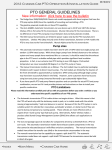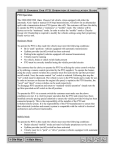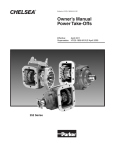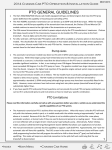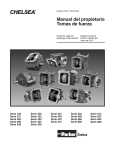Download Chrysler RAM 5500 2013 Installation guide
Transcript
2011 Chassis Cab PTO Operation & Installation Guide 06/24/2010 PTO GENERAL GUIDELINES New information: click here to see the bulletin • • • • The Dodge Ram 3500/4500/5500 Chassis cab models equipped with diesel engines that have the PTO prep option (LBN) have the capability of mounting and controlling a PTO. The gasoline powered models do not have PTO capability. The Aisin AS68RC Automatic transmission can use devices up to 35 HP and 130 ft‐lbs torque. Chelsea 270 or 252 series fit this transmission. Muncie CS6 series fit this transmission. There is no difference in how PTO and pump mount between 4x2 and 4x4 automatic models. The G56 manual transmissions are limited in power output only by the PTO manufacturers’ maximums. Chelsea 442 (deep mount) series fit this transmission, however on 4x4 models this PTO is very close to the front driveshaft . Muncie Alpha series fits this transmission. Pump sizes • • • The automatic transmission models have been test fit with 17 GPM rated size single pumps and tandem 11 GPM rated pumps. While these larger pumps have limited clearance to the exhaust system and many people have mentioned this as a concern, it should be noted that the exhaust pipe in the PTO area is a double walled pipe which provides significant heat insulation properties. In fact, in our extreme heat PTO testing in over 100 degree F Fahrenheit temperature we never exceeded 200 degree F on the PTO, pump or hoses. The manual transmission models are as follows: The 4x2 models have no particular packaging limitations with respect to direct mount pumps. The 4x4 models are limited by the location of the front driveshaft to approximately a standard 11 GPM rated pump (although larger pumps may have been successfully fitted in the field). However, some customers have had success using bent axis piston pumps (mounted forward) to get substantially higher flows. If you have specific PTO and pump fitment questions and can provide the actual PTO and pump combination, we can test fit it and provide pictures and instructions on how to install your specific combination. PTO Limitations Please read this information carefully and call us with any questions before you order a vehicle so you understand the specific capabilities of our PTO system. • The Automatic transmission PTO is turbine driven not engine driven. What this means is that the PTO will work only with the stationary mode in park, or in mobile mode with the vehicle moving at approximately 7 mph and above or in neutral. Because of this the PTO system is not a suitable system for vehicles like: snow plows, autoloader wreckers, or dump trucks if they are used to dump and spread at a crawling speed. These vehicles are more effective with an engine driven ‘clutch pump’ type hydraulic pump. Alternatively, Parker‐Chelsea makes a product called Stored Energy Management System (SEMS) that allows such applications to function. • The size and package space do not allow for components driven by a driveshaft from a PTO on our trucks. The automatic transmission models have exhaust system components in the way that cannot be relocated because it will effect emissions compliance. The manual transmission models have either the transfer case (4x4) or the transmission crossmember in the way. The manual transmission has the capability to support a split shaft PTO. The automatic transmission model does not support a split shaft PTO because the transmission cannot be held in direct drive gear. • 01/22/2010 2011 Chassis Cab PTO Operation & Installation Guide PTO Operation The 3500/4500/5500 Ram Chassis Cab vehicle, when equipped with either the automatic Aisin 6spd or manual G-56 6spd transmissions, will allow for an aftermarket upfit with a transmission driven PTO (power take off). The customer will have the ability to operate the PTO in either a “stationary” or “mobile” mode. The vehicles will be factory set to the “stationary” mode. In order to select the “mobile” mode a Chrysler Group LLC Dealership is required to modify the vehicles settings using their proprietary Dealer service tool. Under normal operation the vehicle will go to a 900 rpm when PTO is engaged. By utilizing the cruise switches the idle speed can then be adjusted to between 900 and 2000 rpm’s. Stationary Mode This feature interacts with the transmission to utilize an auxiliary shaft to drive equipment. Activated by a switch inside the cab, this feature operates only when the vehicle is stationary. The input is switched to ground. Once active, the engine speed increased by holding the RES ACCEL button on the steering wheel or decreased by holding the COAST button. Stationary PTO is available only when the vehicle is stationary. When the truck is equipped with an automatic transmission, it must be in Park and the service brake must be released and functional. When the truck is equipped with a manual transmission, the Parking Brake must be Set and the service brake must be released and functional. To operate the PTO in this mode the vehicle must meet the following conditions: • Be in “park” position ( vehicles equipped with automatic transmission) • Upfitter provider (on/off) switch has been activated • Parking brake applied (vehicles equipped with manual transmission) • Clutch not depressed (clutch interlock switch) • Vehicle must be running • No transmission, engine, accelerator, brake or clutch switch faults present • PTO must be correctly installed using the vehicle provided circuits The customer has the choice to operate the PTO by utilizing the cruise control switches or by utilizing a remote control (provided by the PTO supplier). To operate the feature using the cruise control switches the customer must first activate the up fitter provided on/off switch. The vehicle is now in the PTO mode and is ready for use. In order to ALL + - IN OUT 01/22/2010 2011 Chassis Cab PTO Operation & Installation Guide increase or decrease the engine idle speed, to optimize the PTO function, the “accel” and “decel” cruise switches can be used respectively. To disengage PTO operation and return to “standard vehicle operation” simply turn the up fitter provided on/off switch to the off position. To operate the PTO via a remote switch the customer must make sure the above conditions are met. It is vital for proper operation that the PTO and remote have been installed correctly paying special attention to ensure the vehicle provided wiring has been connected properly. This is the responsibility of the installer of the PTO and switches/remote system. It is the responsibility of the PTO manufacturer to ensure that their electrical (switches and remote) system is compatible with the vehicle’s electrical architecture and software functionality. Mobile Mode This feature is activated by a switch (close to ground) in the cab after selected by a service tool. When active, this feature limits engine speed and road speed to calibrated values. When this feature is selected stationary PTO and Remote PTO features (the idle increase features in PTO mode) are not available. To operate the PTO in this mode the vehicle must meet the following conditions: • Dealer selected “mobile” mode activated via Dealer proprietary service tool • Upfitter provider (on/off) switch has been activated • Vehicle must be in “park” or “drive” position (vehicles equipped with automatic transmission) • Parking brake must not be applied • No vehicle, brake or clutch switch faults present • Vehicle must be running • PTO must be correctly installed using the vehicle provided circuits The customer may choose to use the PTO while the vehicle is moving. To do so the PTO function must be activated prior to taking the vehicle out of “park”. This is accomplished by activating the up fitter provided PTO on/off switch. At this point the customer may place the vehicle in a forward, reverse gear, or neutral and have PTO operation. To disengage PTO operation and return to “standard vehicle operation” simply turn the up fitter provided on/off switch to the off position. ALL + - IN OUT 01/22/2010 2011 Chassis Cab PTO Operation & Installation Guide Remote Stationary mode This feature interacts with the transmission to utilize an auxiliary shaft to drive equipment. Activated by a switch outside of the cab, this feature operates only when the vehicle is stationary. The input is switched to ground. Once active, the engine speed is changed when the switch changes from Off (open circuit) to On (closed to ground) or toggled in less than ½ second. Toggling the switch On-Off-On triggers the engine to change to the next calibrated engine speed. This can be repeated for up to five engine speed settings. Repeated toggles cycles through the engine speed 1-2-3-4-5-1-2 and so on. Remote PTO can be calibrated for one to five selectable engine speeds. The engine speeds are also calibrated. Remote PTO feature has a higher priority than Idle Up. If the Remote PTO feature is active the Idle Up switches are ineffective. The Idle Up or Stationary PTO feature cannot be activated until the Remote PTO relinquishes control To operate the PTO in this mode the vehicle must meet the following conditions: • Be in “park” position ( vehicles equipped with automatic transmission) • Upfitter provider (on/off) switch has been activated • Parking brake applied (vehicles equipped with manual transmission) • Clutch not depressed (clutch interlock switch) • Vehicle must be running • No transmission, engine, accelerator, brake or clutch switch faults present • PTO must be correctly installed using the vehicle provided circuits Various features provided by the Cummins module Single Set Speed ( sub set of remote PTO) Single set speed allows the customer to set up the PTO to operate at a single idle speed. This speed is “remembered” through ignition cycles or battery disconnect. The set point can be changed unlimited times and in increments of 25 rpm’s. These are the instructions to learn and unlearn Single Set Speed: ALL + - IN OUT 01/22/2010 2011 Chassis Cab PTO Operation & Installation Guide LEARNING SET SPEED NOTE: This Feature Requires Engine Calibration Software released in December 2008: If your vehicle was produced before December 2008, you must have the dealer “Reflash” the engine controller to December 2008 or later engine software. In order for this feature to work the PTO MUST be wired as REMOTE PTO (pto switch between F425 and V937) not standard PTO. ¾ ¾ ¾ ¾ ¾ ¾ ¾ Key ON (Engine not running) Press and release Cruise SET button 5 times within 10 seconds Start Engine (Engine Running) Go into IDLEUP Mode (Cruise ON then SET to go to 900 RPM) Set the desired speed (using cruise switches) Press Cancel Turn key off (to save the setting) UNLEARNING SET SPEED ¾ Key ON (Engine not run) ¾ Press and release Cruise Set button 5 times within 10 seconds. Note: To LEARN a new speed, first UNLEARN the old speed ¾ Once the idle speed is LEARNED, the engine will go to that idle speed whenever the Remote PTO switch is turned on, without additional operator assistance. ¾ PTO will engage first and then the idle speed will ramp up to the LEARNED speed, thus not violating the AISIN requirement of not allowing PTO engagement above 1000 RPM. ¾ The LEARNED speed is saved at power down. ALL + - IN OUT 06/01/2011 2011 Chassis Cab PTO Operation & Installation Guide 5 preset idle speeds (sub set of remote PTO) This feature comes factory preset to the following 5 engine idle speeds 900, 1100, 1300, 1500, 1700 rpm’s. They are attained by successively toggling the PTO switch on and off, by doing so the idle speeds will step through the preset speeds and will wrap back around to the beginning set speed if the on/off switch is toggled enough times. These set speeds can be changed to any speed between 900 and 2000 rpm’s using a dealer service tool. This will give the customer the ability to have multiple idle speeds to operate his/her equipment. Remote Throttle and Remote Throttle Switch This feature allows the user of a continuously variable throttle. This throttle potentiometer is power by the 5 volt supply and sensor return lines provided. This feature is activated when the Remote Throttle Switch is On (closed to ground) and the main throttle is closed. Remote Throttle does not require idle validation switches and is not to be used for main vehicle accelerator. Accelerator interlock This allows the accelerator to be locked out when activated. This feature is often used in conjunction with remote PTO or remote throttle. While active it disables the vehicles accelerator pedal typically for safety reasons. Switched Max Operating Speed This feature selects a lower maximum engine speed when the switch is On (closed to ground). The lowered engine speed is can be changed. Switch Return Electrical return/ground for switch circuits. J1939 Interface Cummins provides this interface to “gate” certain CAN messages for customer use. It is an industry standard three way connector located underhood. Messages included are vehicle speed, engine speed, park brake on/off, system voltage – filtered, brake switch status, clutch switch engaged, wait to start lamp status and coolant temp. ALL + - IN OUT 01/22/2010 2011 Chassis Cab PTO Operation & Installation Guide Stationary PTO/Remote PTO Calibrations: Maximum Engine Torque The engine torque will be limited to this value when PTO or Remote PTO is Active. Maximum Vehicle Speed The maximum vehicle speed allowed before deactivating PTO. Range 1-25 MPH. Minimum Engine Speed Defines the lower limit engine speed can be adjusted to when PTO/Remote PTO is active. The engine speed can be reached by either Ramp down or Bump down. Maximum Engine Speed Defines the upper limit engine speed can be adjusted to when PTO/Remote PTO is active. The engine speed can be reached by either Ramp up or Bump Up. Engine Speed Ramp Rate The ERPM/second change rate allowed during a ramp up or ramp down. Idle Up Set Speed Initial engine speed when Idle up is activated. Number of Remote PTO Speed Settings Total number of engine speed selections available to Remote PTO feature. Range 1-5. Remote PTO Speed Setting 1, 2, 3, 4 and 5 Individual engine speed settings available to Remote PTO feature. . Electrical Connection to the Vehicle The vehicle wiring provides an easy access point to connect your PTO. There are two locations provided for ease of interface 1) is a 8 way connector located on the left side of the vehicle near the bell housing of the transmission and 2) is a connector located in the cab of the vehicle. These connectors contain the circuits required to integrate the PTO to the vehicles electrical system. The following chart is provided to assist in correctly interfacing the PTO with the vehicle: ALL + - IN OUT 01/22/2010 2011 Chassis Cab PTO Operation & Installation Guide PTO Circuit Definition Chart The following chart is provided to assist in correctly interfacing the PTO with the vehicle: Shown here is the 8 way connector and pinout of the circuits at the bell housing of the transmission ALL + - IN OUT 01/22/2010 2011 Chassis Cab PTO Operation & Installation Guide ALL + - IN OUT 01/22/2010 2011 Chassis Cab PTO Operation & Installation Guide ALL + - IN OUT 01/22/2010 2011 Chassis Cab PTO Operation & Installation Guide ALL + - IN OUT 01/22/2010 2011 Chassis Cab PTO Operation & Installation Guide ALL + - IN OUT 01/22/2010 2011 Chassis Cab PTO Operation & Installation Guide ALL + - IN OUT ALL + - IN OUT 01/22/2010 2011 Chassis Cab PTO Operation & Installation Guide Description of Pressure Ports for the Aisin Transmission. PTO Pressure Line to be connected only to #9 Line Main Pressure. Location of the Pressure Plugs Right Right Side Side Veiw View(Passenger (Passengerside) Side) ③ ② ① ⑦ ⑥ ⑤ ④ ① ② ③ ④ ⑤ ⑥ ⑦ Torque Converter Out (to Cooler) B1 (Brake No1) Pressure B2 (Brake No2) Pressure L/U (Lock Up Clutch) Pressure LeftSide SideVeiw View(Driver (Driverside) Side) Left ⑧ ⑨ C1 (Clutch No1) Pressure C2 (Clutch No2) Pressure C3 (Clutch No3) Pressure ⑩ Hole Detail (All) ⑧ Lubrication ⑨ Line (Main) Pressure ⑩ Torque Converter In (from Cooler) φ14.1 12° 45° 2.5 15 1/2-20UNF-2B M10x1.25 ALL + - IN OUT 2011 Chassis Cab PTO Operation & Installation Guide 01/22/2010 PTO Installation Alternative In addition to the current method of PTO installation from beneath the vehicle, an alternative method has been developed that allows the installation from above by removing the PTO patch panel in the floor. The instructions are as follows. 1. Remove the rear package tray located behind the seat from the vehicle. 2. Unbolt the seat and move it to the rear of the cabin where the package tray was removed. 3. Remove the sill guards (rocker panel covers) passenger side to allow the vinyl floor mat to be lifted. They are removed by prying straight up to disengage metal clips. 4. Lift the floor mat and fold it rearward and toward the drivers side to expose the patch panel ALL + - IN OUT 2011 Chassis Cab PTO Operation & Installation Guide 01/22/2010 5. Remove the fasteners and sealer from around the patch panel. Cut away the sound deadener pad to expose the transmission PTO access. 6. You are now able to install and assemble the PTO and pump through the opening. Note: larger pumps must be inserted through the hole and moved toward the rear of the opening before installing the PTO. The pump is then slid forward to connect to the installed PTO. 7. To assemble, reverse the above procedure using RTV to reseal the PTO floor pan patch panel. ALL + - IN OUT

















